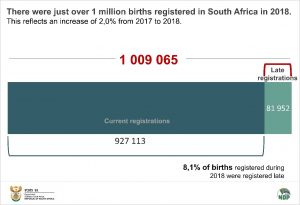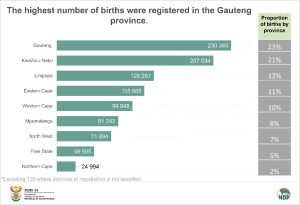More than 1 million births registered in 2018
Just over 1 million births were registered in South Africa in 2018. According to the Recorded live births, 2018 report released by Statistics South Africa, this reflects an increase of 2,0% from 2017 to 2018.
A total of 1 009 065 births were registered in 2018. This includes the total number of births that occurred and were registered for the year 2018, which was 927 113, as well as 81 952 late registrations. This means that 8,1% of births registered during 2018 were registered late. According to the Births and Deaths Registration Amendment Act, a birth must be registered within 30 days of occurrence. However, not all births are registered on time. The report shows that late registration of births, after the lapse of 30 days but before a year, declined from 26,7% in 2014 to 14,2% in 2018. Overall, in the 5-year period (2014–2018), there has been a significant improvement in terms of birth registrations within 30 days from 60,1% in 2014 to 79,6% in 2018.
Mothers in the age group 25−29 years accounted for the highest number of total birth registrations (259 182), followed by those aged 20−24 years (251 551) and 30−34 years (211 251). The lowest number of birth registrations in 2018 occurred for mothers in the 50−54-year age group (381), which is to be expected when the fertility patterns of the country are taken into consideration.
Mothers aged 25–29 and 30−34 years both had the highest proportion (95,6%) of births registered during the year of occurrence, followed by mothers aged 35−39 years (95,2%) and those aged 20–24 years (94,3%). A high proportion of births registered later than the year of occurrence was observed among age groups 10−14 years (60,2%) and 50−54 years (48,6%).
Generally, birth registration remains higher in the most populated provinces in South Africa. The highest proportions of births were registered in Gauteng (20,9%), followed by KwaZulu-Natal (20,4%). The provinces with lower birth registrations in 2018 were Northern Cape at 2,6% and Free State at 5,1%. For all age groups, the highest number of birth registrations for each age category was recorded in either Gauteng or in KwaZulu-Natal. The only exception was teenage mothers (aged 10–14), where Eastern Cape had the highest number of births occurring to teen mothers (317 births), followed closely by KwaZulu-Natal with 310 birth registrations to teenage mothers.
Baby forenames and surnames
In 2018, the most popular first names for males were Enzokuhle, followed by Lethabo and Melokuhle. These three were also the top three names for 2017 births, and the order remained the same. For middle names, Junior was the most popular, followed by Blessing and Gift.
Amongst females, the three most popular first names for 2018 were Enzokuhle, Melokuhle and then Amahle. Similar to males, the order remained the same as that of 2017. For middle names amongst girls, the most popular choices were Precious, Princess and Angel, in that order. Enzokuhle, Melokuhle, Omphile and Amogelang were in the top ten list of names for both sexes. All the top ten first names for both sexes were of native languages. Most of the popular baby names for males and females reflect positive hopes for the child, express beliefs or are inspired by positive connotations of both love and acceptance.
Nationally, the most prevalent surname for both sexes was Dlamini, followed by Nkosi and then Ndlovu. It is interesting to note that nine of the surnames were from the Nguni clans, namely isiZulu, isiXhosa, isiNdebele and siSwati. Mokoena – which featured as the sixth most popular surname – was the only non-Nguni surname.
For more information, download the latest Recorded live births, 2018 report here.



